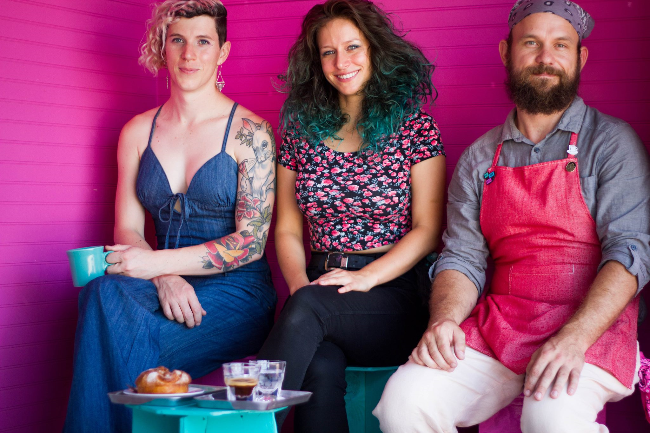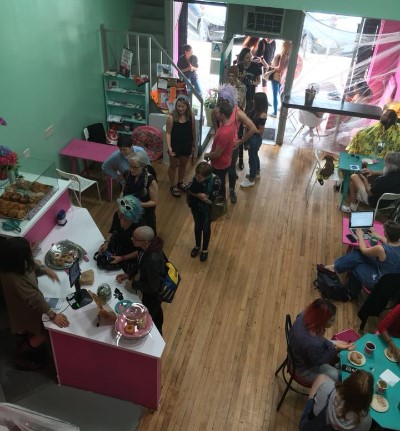What does a fully inclusive safe space for the Los Angeles queer community look like in 2017? Cuties Coffee, a new queer owned and operated coffee shop in Hollywood, aims to answer that question.
Founders Virginia Bauman and Iris Bainum-Houle came up with the idea for the café in 2015 after struggling to find a community as newcomers to the city. “We went to events and we felt like our whole identities either weren’t being seen or acknowledged,” Bainum-Houle explains. Knowing the shop would take time to fully realize, Bauman says the immediate goal became “creating community with whatever means we had.” Thus, Queers, Coffee, and Donuts—a monthly event designed to connect local members of the community—was born.
It took off and in July the shop opened as a safe space for the community and a home for the popular event. Bainum-Houle best shares the need for intentional safe spaces when they say, “Queer spaces provide room for people to have their full expression as a human being rather than following a script or a societal norm.”
“There are so many hurdles to building community. It’s hard to find people in such a big city. It’s hard to find people who are like-minded,” said Bauman, elaborating on Cuties’ role. “It’s hard to get there once you find them and it’s hard to have a reason to all gather. So all of those things are trying to be addressed in one way or another by the things that we do.”

Cuties does all it can to make finding queer community easier. The shop shares not only their own events, but those hosted by other community members on Instagram. The founders have offered space for clubs and groups to host their meetings, thus providing a safe and accessible space to those who need it. Cuties offers a weekly newsletter that includes a section titled “Adventures from the Couch,” which outlines ways to stay connected to the larger queer conversation even if leaving home isn’t on the agenda for the week.
Cuties is everything I wish I’d had when I was a teenager figuring out my sexuality and coming out in a small Southern town. The only queer spaces I had access to were windowless gay bars. Entry required that I show ID in a small “greeting room” and be vetted by security before being deemed safe to enter. In stark contrast, Cuties is free of gatekeeping and stress: diverse groups of people flow in and out of the shop, taking time to chat with the friendly baristas, sit for leisurely conversations with one another, and check out the library of books beside the counter or the bulletin board listing LGBTQ-friendly housing options. The amount of effort and planning behind the shop couldn’t be clearer.
In the future, housing is another community need Cuties would like to delve deeper into. “A lot of our work is about being connectors, connecting people to one another whether that’s as finding friends, finding work, finding roommates. So it just seemed like a natural progression for us to start connecting people to safer more inclusive housing options,” says Bainum-Houle.

Cuties is an energetic departure from the bars and clubs dotting West Hollywood’s iconic LGBTQ strip on Santa Monica Boulevard. There are no flashing lights, no pounding speakers or shirtless dancers. The shop boasts brightly colored walls and furniture, plenty of sunlight, and a spacious location to hang out alone or with others. Bainum-Houle explains that the goal is to make it welcoming to all: “The bar scene has been super crucial throughout queer and trans history. These are crucial, crucial spaces but I think they can be very alienating. It’s 21 and up, so you need to either need to have a fake ID or you need to be over 21. Also, the older queer and trans generations, they don’t always feel welcome or safe or even like they can necessarily enjoy those spaces. But a coffee shop? Anyone, any age can come and exist and talk and just be or make a real connection with another person.” Cuties doesn’t serve alcohol, making it accessible to sober members of the community and those in recovery who may not want to be part of the bar scene.
The practice of maintaining a welcoming space comes directly from personal experience. “We tried to have those experiences that we had each had personally inform our decisions going forward about how we wanted to create safe space. And that took the form of the Codes of Conduct that we have on all of our events,” says Bainum-Houle. Some of the points included in these rules are: reminding attendees that they should always ask for preferred personal pronouns rather than assume, that all touching must be consensual, and that hate speech is never tolerated. The heart of Cuties is, in large part, the care shown by the founders. “We have hundreds of queer children,” Bauman points out, laughing. “What we’re building is hopefully a legacy,” Bainum-Houle continues. “We’re trying to build the future that we didn’t have when we were younger.” If the success of the shop within the community is anything to go on, that’s a goal they’ve already conquered.


